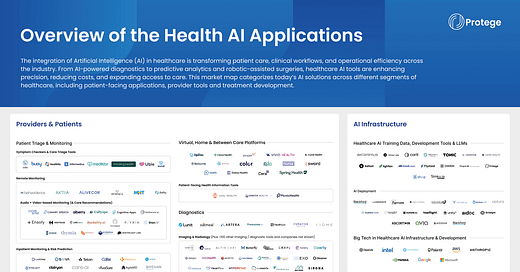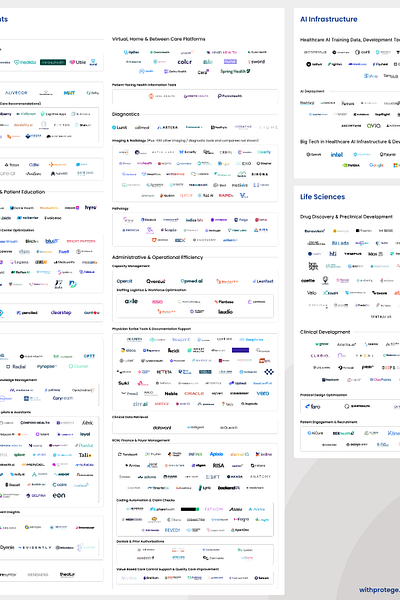Protege's Healthcare AI Market Map
The integration of Artificial Intelligence (AI) in healthcare is transforming patient care, clinical workflows, and operational efficiency across the industry. From AI-powered diagnostics to predictive analytics and robotic-assisted surgeries, healthcare AI tools are enhancing precision, reducing costs, and expanding access to care. Our market map categorizes today’s AI solutions across different segments of healthcare, including patient-facing applications, provider tools and treatment development.
I. Providers & Patients: This category focuses on AI solutions that directly influence patient care and the interaction between providers and patients.
Patient Triage & Monitoring:
Symptom Checkers & Care Triage Tools: Platforms enabling patients to self-assess symptoms and receive guidance on appropriate care next steps.
Remote Monitoring: Tools that track patient health metrics remotely, allowing proactive care management.
Audio + Video-based Monitoring (& Care Recommendations): Advanced technology that leverages audiovisual inputs for real-time patient monitoring and care suggestions, particularly for mental and neurological health conditions.
Inpatient Monitoring & Risk Prediction: Continuous monitoring systems that keep tabs on symptoms and predict patient risks, helping clinicians prevent adverse events.
Practice Communications & Patient Education: Effective communication and education are essential for patient engagement. AI technologies here focus on enhancing these interactions, and include:
Speech-based Communications & Call Center Optimization: Natural language processing tools that leverage voice-based AI agents and/or drive call center operational efficiency.
Text-based Communications: AI chatbots and messaging platforms that facilitate timely and informative patient-provider communication.
Virtual, Home & Between Care Platforms: Solutions supporting telehealth and seamless care transitions between appointments are critical for care in a modern world.
Patient-facing Health Information Tools: These applications empower patients to take ownership of their health with personalized health information, fostering proactive health management.
Diagnostics: AI is revolutionizing diagnostics by improving accuracy, reducing turnaround times, and assisting clinicians in making informed decisions. Sub-categories in this section include:
Imaging & Radiology: AI algorithms are transforming medical imaging by enhancing interpretation accuracy and assisting radiologists in identifying anomalies and enhancing workflows.
Pathology: Advanced AI tools analyze pathology slides and tissue samples, aiding in the detection of diseases.
Patient Management: AI-driven patient management tools support clinicians in making evidence-based treatment decisions and optimizing care pathways. Sub-categories include:
Clinical Decision Support: Systems offering real-time, data-driven insights to inform diagnoses and treatments.
Medical Evidence Search Engines / Knowledge Management: Platforms that rapidly aggregate and analyze medical literature / data for on-the-go clinical reference.
Care Navigation & Coordination / Co-pilots & Assistants: Comprehensive AI-driven solutions that streamline workflows, enhance care coordination, and empower clinicians and practice administrators with multi-faceted support tools, co-pilots, and assistants to optimize patient care operations.
AI Data Insight Tooling for Patient Care & Practice Management Solutions: Analytics platforms that seek to enhance patient outcomes and practice efficiency with data-driven AI insights.
Patient Record Summarization: AI applications that condense complex patient histories into concise, actionable summaries.
Surgery Support: Robotic-assisted surgeries and AI-driven planning tools that enhance surgical precision and improve patient outcomes.
Administrative & Operational Efficiency: AI is optimizing healthcare operations, reducing administrative burdens, and improving overall efficiency.
Capacity Management: Predictive analytics tools help healthcare facilities manage patient flow and optimize resource allocation.
Staffing Logistics & Workforce Optimization: AI-driven platforms streamline workforce planning, ensuring optimal staff deployment based on patient needs.
Physician Scribe Tools & Documentation Support: Ambient AI scribe tools transcribe and summarize clinical conversations, automatically generating documentation that integrates into the EHR.
RCM, Finance & Payor Management: AI is enhancing the financial side of healthcare, streamlining RCM & billing, simplifying complex insurance processes, and supporting value-based care arrangements. .
Coding Automation & Claim Checks: AI tools support automatic and accurate medical coding and validate claims, reducing errors and speeding up reimbursements.
Denials & Prior Authorizations: AI platforms expedite prior authorization processes and help manage insurance claim denials more effectively.
Value-Based Care Control Support & Quality Care Improvement: Solutions in this segment assist practices in transitioning to value-based care models, focusing on improving care quality and reducing costs.
II. Life Sciences: AI is playing a pivotal role in advancing drug discovery and clinical trials for life sciences companies, helping bring life-saving treatments to patients faster.
Drug Discovery & Preclinical Development: AI applications accelerate drug discovery by identifying promising targets & biomarkers, accelerating preclinical testing, and optimizing drug attributes.
Clinical Development: AI tools enhance clinical trial design planning, trial execution, and data analysis, improving trial outcomes.
Protocol Design Optimization: AI-driven platforms refine clinical protocols, ensuring efficiency and adherence to regulatory standards.
Patient Engagement & Recruitment: AI solutions streamline the identification and engagement of suitable trial candidates, boosting recruitment rates.
III. AI Infrastructure: The backbone of healthcare AI lies in its robust infrastructure, including data models and deployment platforms.
Healthcare AI Training Data, Development Tools & LLMs: AI/LLM-focused companies seek to provide data and infrastructure for healthcare AI developers. Additionally, foundational AI models, including large language models (LLMs), are generated and tailored to power healthcare infrastructure.
AI Deployment: Deployment platforms / companies ensure the seamless integration of AI across healthcare systems.
Big Tech in Healthcare AI Infrastructure & Development: Major technology companies play a significant role in developing and scaling AI infrastructure for the healthcare industry.




